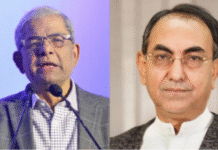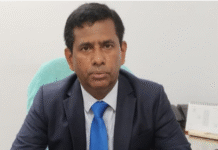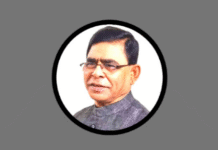The unresolved election eve enigma
 Now that the 30 December national election is done and over with, little bits of truth are slipping out here and there. The officials involved in the election themselves are admitting to certain discrepancies. The most significant among these admissions is that ballot boxes were stuffed on the night before the election.
Now that the 30 December national election is done and over with, little bits of truth are slipping out here and there. The officials involved in the election themselves are admitting to certain discrepancies. The most significant among these admissions is that ballot boxes were stuffed on the night before the election.
Previously it had been the opposition or the independent candidates that made such allegations. Or the media, even BBC, came up with such reports. But now there are direct and indirect admissions of such discrepancies and that is coming from small allies of the ruling alliance as well as the constitutional institution – the election commission.
Such admissions about the votes being cast on the night before the election are important, no doubt, for the truth to emerge. But even more alarming is the invisible force that spreads its influence over the election. The chief election commissioner KM Nurul Huda and Workers Party president, former minister Rashed Khan Menon, made significant comments in this regard. Menon’s statement is not just a perfunctory political one.
In parliament, he raised the issue of malevolent forces influencing the election. He said that if various facets of the state machinery enforce their control over the country, then political parties lose relevance not only in the election, but in running the state itself. Another ally of the ruling alliance, Bangladesh JSD, also blamed over enthusiastic quarters of stuffing the ballot boxes on the night before the election.
In the very same week, chief election commissioner Nurul Huda and the other commissioners started speaking out too. It was first election commissioner Mahbub Talukdar who opened his mouth. He said that an inclusive election wasn’t necessarily a fair one. Then the chief election commissioner Nurul Huda that that the election in certain areas wasn’t carried out properly.
Then another election commissioner Shahadat Hossain said that that there would be no ballot stuffing on the night before the upazila election. And the very day after that, the chief election commissioner said, “We will use the EVMs (Electronic Voting Machines) from the next election, then there will be no scope to stuff the ballot boxes on the night before.” All these remarks are clearly admissions, albeit indirect, of the ballot boxes being stuffed on the eve of the election.
It is not clear why the chief election commissioner wants to use EVMs to prevent the ballots being stuffed into the boxes the night before the election. All over the world there is talk of manipulating votes cast though EVM, by means of hacking or remote control. The arguments against such contentions are weak and flimsy. The chief election commissioner himself admitted to the problems in the EVMs used in six constituencies during this election. Does that mean he wants to resort to technology to rig the votes? Or is he trying to justify the huge expenditure involved in procuring such machines?
Even more worrisome is his comment that this election commission doesn’t have the power or the competence to give lessons on how to determine who is responsible for the irregularities in the election and what action is to be taken against them. He said the commission didn’t have the scope to say why all this was happening, who was behind it and who was responsible. Though being empowered by the constitution on all matters regarding the election, he declines to take responsibility of determining those responsible for the discrepancies and also to take action against them. This brings forward a host of questions.
Then there is the instance of election commissioners from Maldives fleeing to Sri Lanka for their lives. They fled to uphold the people’s verdict rather than to succumb to the president’s pressure. Why does our commission talk of its lack of power and competence?
If the ballot boxes were indeed filled on the night before the polls, why should the result of the election be accepted? There are demands at home and abroad for investigations to be made into the admissions that are seeping out here and there. Such demands must be taken into cognizance.
And now the election commission is making a big noise about ensuring that the upazila election is competitive one. It has ordered certain MPs to leave their areas and has suspended the voting in three upazilas as the environment was not conducive to fair election there. But after the huge damage done in the national election, such drama will make no difference. Already there will be no need to vote for chairmen in 96 of the 481 upazilas, that is, one in every five. The left front was quite right then in saying, after the Dhaka North city corporation polls, that there was no justification in wasting public funds on such farcical elections.
The dark clouds of the national elections now loom large over the DUCSU polls. The university authorities have long been lackeys of those in power. Rather than turning to the police, the vice chancellor turns to the government-backed Chhatra League for protection against student protest. So what can be expected from him? Chhatra League has violated the election code and has been harassing the opposition candidates. If the results of this election prove to be any different, all credit will go to the students.
* Kamal Ahmed is a senior journalist. This piece appeared in Bangla in Prothom Alo print version and has been rewritten here in English by Ayesha Kabir









